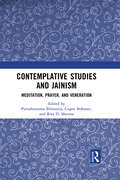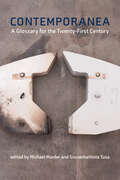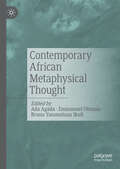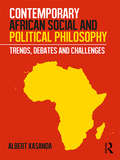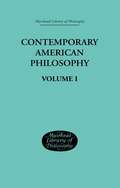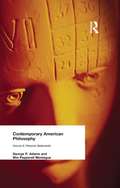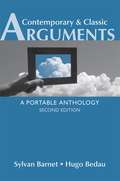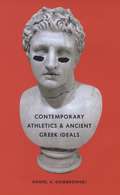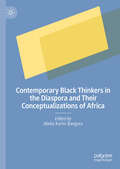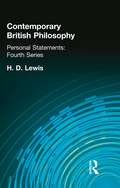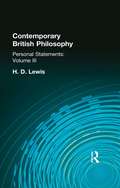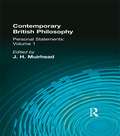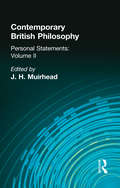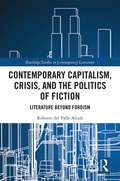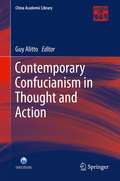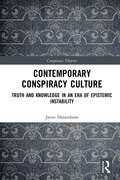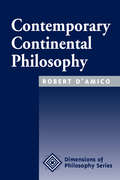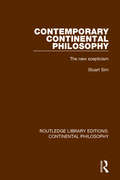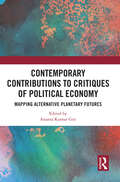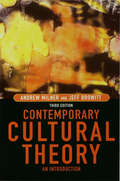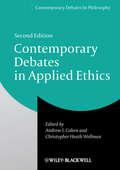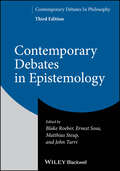- Table View
- List View
Contemplative Studies & Jainism: Meditation, Prayer, and Veneration
by Purushottama Bilimoria Cogen Bohanec Rita D. ShermaThis volume is one of the first wide-ranging academic surveys of the major types and categories of Jain praxis. It covers a breadth of scholarly viewpoints that reflect both the variegation in terms of spiritual practices within the Jain traditions as well as the Jain hermeneutical perspectives, which are employed in understanding its rich diversity. The volume illustrates a complex and nuanced understanding of the multifaceted category of Jain religious thought and practice. It offers a rare intrareligious dialogue within Jain traditions and at the same time, significantly broadens and enriches the field of Contemplative Studies to include an ancient, ascetic, non-theistic tradition. Meditation, yoga, ritual, prayer are common to all Indic spiritual traditions. By investigating these diverse, yet overlapping, categories one might obtain a sophisticated understanding of religious traditions that originally emerged in South Asia. Essays in this book demonstrate how these forms of praxis in Jainism, and the philosophies that anchor those practices, are interrelated, and when brought into dialogue, help to foster new tools for understanding a complex and variegated tradition such as Jain Dharma. This book will be useful to scholars and researchers of religious and theological studies, contemplative studies, Jain studies, Hindu studies, consciousness studies, Yoga studies, Indian philosophy and religion, sociology of religion, philosophy of religion, comparative religion, and South Asian studies, as well as general readers interested in the topic.
Contemporanea: A Glossary for the Twenty-First Century
by Michael Marder Giovanbattista TusaA groundbreaking, multidisciplinary collection that rethinks our present moment and anticipates the key concepts that will shape and direct the twenty-first century.Contemporanea is a nascent lexicon for the twenty-first century edited by seasoned philosophers and authors Michael Marder and Giovanbattista Tusa. The collection showcases perspectives from a range of noteworthy thinkers in philosophy, ecology, and cultural studies, as well as artists, from across the globe, including Slavoj Zizek, Timothy Morton, Denise Ferreira Da Silva, and Vandana Shiva, who each describe what they anticipate will be the concepts shaping the trajectory of this century—everything from the world state to the nuclear taboo, automation to Teslaism, plant sexuality to arachnomancy, and ecotrauma to resonances, to name a few.This century, as the editors explain, has to date grounded itself in the debris of the preceding century, whose revolutions and struggles failed to transform our time: post-colonialism, post-fascism, and post-liberalism have morphed into neocolonialism, neoliberalism, and neofascism, often combined in a previously unimaginable mix. And, just as the political developments at the beginning of the twenty-first century revived and reshuffled those of the preceding epoch, so too have philosophical trends sought to breathe fresh life into the stillborn -isms of the past—realism, vitalism, logicism, materialism, empiricism, criticism—adding the adjective &“new&” and sometimes &“radical&” before them. To articulate a different future, another language is needed. And, to develop another language, one needs to develop fresh concepts, including the concepts proposed in this collection.ContributorsMieke Bal, Claudia Baracchi, Amanda Boetzkes, Erik Bordeleau, Anita Chari, Emanuele Coccia, Valentina Desideri, Roberto Esposito, Filipe Ferreira, Denise Ferreira da Silva, Claire Fontaine, Graham Harman, Yogi Hale Hendlin, Ranjit Hoskote, Cymene Howe, Daniel Innerarity, Joela Jacobs, Ken Kawashima, Sabu Kohso, Bogna Konior, Brandon LaBelle, Anna Longo, Artemy Magun, Michael Marder, Michael Marder, Jason Bahbak Mohaghegh, Timothy Morton, Mycelium, Jean-Luc Nancy, Bahar Noorizadeh, Kelly Oliver, Uriel Orlow, Richard Polt, Marcia Sá Cavalcante Schuback, Tomás Saraceno, Vandana Shiva, Anton Tarasyuk, Anaïs Tondeur, Giovanbattista Tusa, Sjoerd van Tuinen, Santiago Zabala, Zahi Zalloua, Slavoj Žižek
Contemporary African Metaphysical Thought
by Ada Agada Emmanuel Ofuasia Bruno Yammeluan IkuliAfrican metaphysics question a variety of issues, ranging from the nature of fundamental reality to the meaning of human existence. African philosophers have introduced groundbreaking metaphysical theories in response to these metaphysical issues and questions. These theories provide uniquely African perspectives that challenge philosophers to look inwards and produce globally competitive ideas instead of exoticising traditional African worldviews for the intellectual entertainment of a non-African audience. This volume advances the field of African metaphysics by critically engaging with key metaphysical ideas and concepts developed by African metaphysical thinkers. The chapters contributed in this volume by established researchers and promising young scholars challenge and modify existing metaphysical theories while proposing novel theories that shape debates in the field.
Contemporary African Social and Political Philosophy: Trends, Debates and Challenges
by Albert KasandaThis book explores what constitutes contemporary African social and political philosophy with regard to its meaning, aims, sources, and relevance for today’s Africa. Kasanda denounces conventional approaches considering these either as a subcategory of general philosophy or as the ideological attempts of individual African leaders and professional philosophers, such as Nkrumah, Nyerere, Senghor, Fanon, Hountondji and Towa. On the contrary, Kasanda defines contemporary African social and political philosophy as an inclusive reflection of African communities with regard to power and equitable modes of social and political organization in order to promote human excellence for everyone. This perspective also includes the criticism of social and political concepts in use within African communities. The author postulates that contemporary African social and political philosophy relies on the legacy of precolonial African societies, as well as on the contribution of the diaspora throughout the world. Contemporary African social and political philosophy is rooted in the daily lives of African people, and it expresses itself through multiple modalities including, for example, art, religion, literature, music and the policy of urbanization of African cities. This book sheds new light on debates concerning topics such as ethnophilosophy, negritude, pan-Africanism, democracy, African civil society, African cultures, and globalization. It aims to ward off the lethargy that strikes African social and political philosophy, taking a renewed and critical approach.
Contemporary American Philosophy: Personal Statements Volume I (Muirhead Library Of Philosophy Ser.)
by Adams, George P and Montague, Wm PepperellFirst published in 2002. Routledge is an imprint of Taylor & Francis, an informa company.
Contemporary American Philosophy: Personal Statements Volume II (Muirhead Library Of Philosophy Ser.)
by Adams, George P and Montague, Wm PepperellFirst published in 2002. Routledge is an imprint of Taylor & Francis, an informa company.
Contemporary and Classic Arguments: A Portable Anthology
by Sylvan Barnet Hugo BedauModelling an extensive range of argumentative writing at half the price, the concise Contemporary & Classic Arguments helps you engage with some of today's most pressing topics through a collection of classic essays that provide time-tested models of effective argument.
Contemporary Arab Thought: Cultural Critique in Comparative Perspective
by Elizabeth Suzanne KassabDuring the second half of the twentieth century, the Arab intellectual and political scene polarized between a search for totalizing doctrines—nationalist, Marxist, and religious—and radical critique. Arab thinkers were reacting to the disenchanting experience of postindependence Arab states, as well as to authoritarianism, intolerance, and failed development. They were also responding to successive defeats by Israel, humiliation, and injustice. The first book to take stock of these critical responses, this volume illuminates the relationship between cultural and political critique in the work of major Arab thinkers, and it connects Arab debates on cultural malaise, identity, and authenticity to the postcolonial issues of Latin America and Africa, revealing the shared struggles of different regions and various Arab concerns.
Contemporary Arab Thought: Cultural Critique in Comparative Perspective
by Elizabeth Suzanne KassabDuring the second half of the twentieth century, the Arab intellectual and political scene polarized between a search for totalizing doctrines-nationalist, Marxist, and religious-and radical critique. Arab thinkers were reacting to the disenchanting experience of postindependence Arab states, as well as to authoritarianism, intolerance, and failed development. They were also responding to successive defeats by Israel, humiliation, and injustice. The first book to take stock of these critical responses, this volume illuminates the relationship between cultural and political critique in the work of major Arab thinkers, and it connects Arab debates on cultural malaise, identity, and authenticity to the postcolonial issues of Latin America and Africa, revealing the shared struggles of different regions and various Arab concerns.
Contemporary Aristotelian Metaphysics
by Tuomas E. TahkoAristotelian (or neo-Aristotelian) metaphysics is currently undergoing something of a renaissance. This volume brings together fourteen new essays from leading philosophers who are sympathetic to this conception of metaphysics, which takes its cue from the idea that metaphysics is the first philosophy. The primary input from Aristotle is methodological, but many themes familiar from his metaphysics will be discussed, including ontological categories, the role and interpretation of the existential quantifier, essence, substance, natural kinds, powers, potential, and the development of life. The volume mounts a strong challenge to the type of ontological deflationism which has recently gained a strong foothold in analytic metaphysics. It will be a useful resource for scholars and advanced students who are interested in the foundations and development of philosophy.
Contemporary Athletics & Ancient Greek Ideals
by Daniel A. DombrowskiDespite their influence in our culture, sports inspire dramatically less philosophical consideration than such ostensibly weightier topics as religion, politics, or science. Arguing that athletic playfulness coexists with serious underpinnings, and that both demand more substantive attention, Daniel Dombrowski harnesses the insights of ancient Greek thinkers to illuminate contemporary athletics. Dombrowski contends that the ideas of Plato, Aristotle, and Plotinus shed important light on issues—such as the pursuit of excellence, the concept of play, and the power of accepting physical limitations while also improving one’s body—that remain just as relevant in our sports-obsessed age as they were in ancient Greece. Bringing these concepts to bear on contemporary concerns, Dombrowski considers such questions as whether athletic competition can be a moral substitute for war, whether it necessarily constitutes war by other means, and whether it encourages fascist tendencies or ethical virtue. The first volume to philosophically explore twenty-first-century sport in the context of its ancient predecessor, Contemporary Athletics and Ancient Greek Ideals reveals that their relationship has great and previously untapped potential to inform our understanding of human nature.
Contemporary Black Thinkers in the Diaspora and Their Conceptualizations of Africa
by Abdul Karim BanguraThis book contends that Afrocentricity and other ideas birthed by major contemporary Black thinkers in the Diaspora are wellsprings for helping to build a new Africa. This book examines these ideas, which have given rise to the Africanist Perspective on the Motherland to place Africa at the center of all intellectual discourses pertaining to African people everywhere while at the same time challenging the pervasive and pernicious Eurocentric myth of African people being inactive agents in history. These contributions from a global range of scholars across disciplines examine the work of contemporary great Black thinkers as sources that can be employed to help in the construction of a new Africa. Each chapter examines how these thinkers conceptualized Africa in their works, with the main objective of delineating their conceptualizations to generate suggestions on how to rebuild the continent.
Contemporary British Philosophy: Personal Statements Fourth Series (Muirhead Library Of Philosophy Ser.)
by Lewis, H DFirst published in 2002. Routledge is an imprint of Taylor & Francis, an informa company.
Contemporary British Philosophy: Personal Statements Third Series (Muirhead Library Of Philosophy Ser.)
by Lewis, H DThis is Volume IX of twenty-two in a collection on 20th Century Philosophy. Originally published in 1964, this text is volume three of three on contemporary British Philosophy and includes personal statements from varied contributors of the time.
Contemporary British Philosophy: Personal Statements First Series (Muirhead Library Of Philosophy Ser.)
by J. H. MuirheadFirst published in 2002. Routledge is an imprint of Taylor & Francis, an informa company.
Contemporary British Philosophy: Personal Statements Second Series (Muirhead Library Of Philosophy Ser.)
by J. H. MuirheadThis is Volume VII of twenty-two of a series on 20th Century Philosophy. Originally published 1925, in this is part two of three offering a collection personal statements by leading philosophical theorists-James Ward, E. Belfort Bax, G.E. Moore, Clement C.J. Webb, G. Dawes Hicks and others.
Contemporary Capitalism, Crisis, and the Politics of Fiction: Literature Beyond Fordism (Routledge Studies in Contemporary Literature)
by Roberto del Valle AlcaláContemporary Capitalism, Crisis, and the Politics of Fiction: Literature Beyond Fordism proposes a fresh approach to contemporary fictional engagements with the idea of crisis in capitalism and its various social and economic manifestations. The book investigates how late-twentieth and twenty-first-century Anglophone fiction has imagined, interpreted, and in most cases resisted, the collapse of the socio-economic structures built after the Second World War and their replacement with a presumably immaterial order of finance-led economic development. Through a series of detailed readings of the words of authors Martin Amis, Hari Kunzru, Don DeLillo, Zia Haider Rahman, John Lanchester, Paul Murray and Zadie Smith among others, this study sheds light on the embattled and decidedly unstable nature of contemporary capitalism.
Contemporary Confucianism in Thought and Action (China Academic Library)
by Guy AlittoThis volume focuses on contemporary Confucianism, and collects essays by famous sinologists such as Guy Alitto, John Makeham, Tse-ki Hon and others. The content is divided into three sections - addressing the "theory" and "practice" of contemporary Confucianism, as well as how the two relate to each other - to provide readers a more meaningful understanding of contemporary Confucianism and Chinese culture. In 1921, at the height of the New Culture Movement's iconoclastic attack on Confucius, Liang Shuming (梁漱溟) fatefully predicted that in fact the future world culture would be Confucian. Over the nine decades that followed, Liang's reputation and the fortunes of Confucianism in China rose and fell together. So, readers may be interested in the question whether it is possible that a reconstituted "Confucianism" might yet become China's spiritual mainstream and a major constituent of world culture.
Contemporary Conspiracy Culture: Truth and Knowledge in an Era of Epistemic Instability (Conspiracy Theories)
by Jaron HarambamIn this ethnographic study, the author takes an agnostic stance towards the truth value of conspiracy theories and delves into the everyday lives of people active in the conspiracy milieu to understand better what the contemporary appeal of conspiracy theories is.Conspiracy theories have become popular cultural products, endorsed and shared by significant segments of Western societies. Yet our understanding of who these people are and why they are attracted by these alternative explanations of reality is hampered by their implicit and explicit pathologization. Drawing on a wide variety of empirical sources, this book shows in rich detail what conspiracy theories are about, which people are involved, how they see themselves, and what they practically do with these ideas in their everyday lives. The author inductively develops from these concrete descriptions more general theorizations of how to understand this burgeoning subculture. He concludes by situating conspiracy culture in an age of epistemic instability where societal conflicts over knowledge abound, and the Truth is no longer assured, but "out there" for us to grapple with. This book will be an important source for students and scholars from a range of disciplines interested in the depth and complexity of conspiracy culture, including Anthropology, Cultural Studies, Communication Studies, Ethnology, Folklore Studies, History, Media Studies, Political Science, Psychology and Sociology. More broadly, this study speaks to contemporary (public) debates about truth and knowledge in a supposedly post-truth era, including widespread popular distrusts towards elites, mainstream institutions and their knowledge.
Contemporary Continental Philosophy
by Robert D'AmicoContemporary Continental Philosophy steps back from current debates comparing Continental and analytic philosophy and carefully, yet critically outlines the tradition's main philosophical views on epistemology and ontology. Forgoing obscure paraphrases, D'Amico provides a detailed, clear account and assessment of the tradition from its founding by Husserl and Heidegger to its challenge by Derrida and Foucault. Though intended as a survey of this tradition throughout the twentieth century, this study's focus is on the philosophical problems which gave it birth and even now continue to shape it.The book reexamines Husserl as an early critic of epistemological naturalism whose grasp of the philosophical importance of the theory of meaning was largely ignored. Heidegger's contrasting effort to revive ontology is examined in terms of his distinction between ontic and ontological questions. In contrast with many earlier studies, the author outlines confusions engendered by the misappropriation of the distinct philosophical agendas of Husserl and Heidegger by such famous figures as Sartre and Merleau-Ponty. The book is also original in its emphasis on how social externalism in epistemology, inspired by Karl Mannheim, influenced this tradition's structuralist and Marxist phases. The philosophical defenses of a theory of interpretation by Gadamer and Habermas are closely examined and assessed and the study concludes with a a probing yet balanced account of Foucault and Derrida as critics of philosophical autonomy. The book concludes by reassessing this century-long divide between the analytic and Continental traditions and its implication for the future of philosophy.
Contemporary Continental Philosophy: The New Scepticism (Routledge Library Editions: Continental Philosophy #1)
by Stuart SimThis title was first published in 2000. Contemporary continental philosophy is a widely-used, but in many ways a highly problematic, term and its exact frame of reference is not always clear. In its more recent French manifestations in particular, it continues to arouse considerable controversy and create bitter divisions, with particularly hostile reactions to the work of Derrida and others. Much work in the recent continental tradition can be fitted into a longer-running philosophical tradition of scepticism, and scepticism has always had the power to provoke and unsettle the philosophical establishment. Presenting an overview of the philosophical landscape of the continental tradition since the 1940s, this book traces the establishment of the new, super-scepticism as an intellectual paradigm with the power to threaten and disorientate existing world-views and more traditional styles of philosophical discourse - marking the continental divide. Exploring how contemporary continental philosophy from existentialism to postmodernism can be characterised as this new, more resistant form of scepticism, Sim identifies a clutch of key themes - including "difference", "the subject", "antifoundationalism", "dialectics" - which have been obsessively worked over by key thinkers in the Existentialist-Postmodernist period and demonstrates how these have contributed to the development of a super-sceptical outlook. Presenting a new theme-led approach to provide an entry into current debates in continental philosophy, Stuart Sim reintegrates the work of Sartre into the more recent continental tradition, and suggests that something qualitatively different is now occurring in French philosophy.
Contemporary Critiques of Political Economy: Mapping Alternative Planetary Futures
by Ananta Kumar GiriThis book analyses contemporary critiques of political economy and highlights the challenges to rethinking contemporary discourses and practices. It carries out a multi-pronged critical and transformative dialogue involving political economy, moral economy, moral sociology, moral anthropology, and spiritual ecology. The authors discuss diverse themes such as the relationship between consciousness and society, the dialogue between Karl Marx and Carl Gustav Jung, a critical sociology of morality and property relations, moral and political economy of the Indigenous peoples and a critique of modern civilization, economic evaluation, as well as alternative traditions of thinking in Marx, Thoreau, Gandhi, J.C. Kumarappa, Rammanohar Lohia, B.R. Ambedkar and Jayaprakash Narain. A unique transdisciplinary text, the book brings together authors and approaches from both the Global North and South. It will be indispensable to students, research scholars and teachers of humanities and social sciences in such fields as economics, sociology, philosophy, cultural studies and development studies.
Contemporary Cultural Theory: An Introduction
by Andrew Milner Jeff BrowittFirst Published in 2002. Routledge is an imprint of Taylor & Francis, an informa company.
Contemporary Debates in Applied Ethics (Contemporary Debates in Philosophy #7)
by Andrew I. Cohen Christopher Heath WellmanNow in an updated edition with fresh perspectives on high-profile ethical issues such as torture and same-sex marriage, this collection pairs cogently argued essays by leading philosophers with opposing views on fault-line public concerns. Revised and updated new edition with six new pairs of essays on prominent contemporary issues including torture and same-sex marriage, and a survey of theories of ethics by Stephen Darwall Leading philosophers tackle colleagues with opposing views in contrasting essays on core issues in applied ethics An ideal semester-length course text certain to generate vigorous discussion
Contemporary Debates in Epistemology (Contemporary Debates in Philosophy)
by Blake Roeber Ernest Sosa Matthias Steup John TurriThe perfect introduction to contemporary epistemology, completely overhauled for its third edition In Contemporary Debates in Epistemology, pairs of specially commissioned essays defend opposing views on some of today’s most compelling epistemological issues and problems. Offering a unique blend of accessibility and originality, this timely volume brings together fresh debates on hotly contested issues to provide readers with the opportunity to engage in comparative analysis of constantly changing and developing epistemological concepts. Now in its third edition, Contemporary Debates in Epistemology features up-to-date coverage of the latest developments in the field. Entirely new essays examine questions of epistemic normativity and knowledge, the relationship between belief and credence, the possibility of internalist epistemology, epistemic instrumentalism, norms of assertion, the use of thought experiments in epistemology, and more. Presents a rigorous yet accessible introduction to the major topics in contemporary epistemology Contains head-to-head chapters offering forceful advocacy of opposing philosophical stances Focuses on core areas of epistemology Uses a lively debate format that sharply defines the issues and encourages further discussion All-new chapters provide fully updated coverage of new and emerging topics in epistemologyPart of the Wiley-Blackwell Contemporary Debates in Philosophy series, Contemporary Debates in Epistemology, Third Edition, remains an essential resource for advanced undergraduate philosophy majors, graduate students in philosophy, and epistemologists who want to keep current with contemporary epistemological debates.
